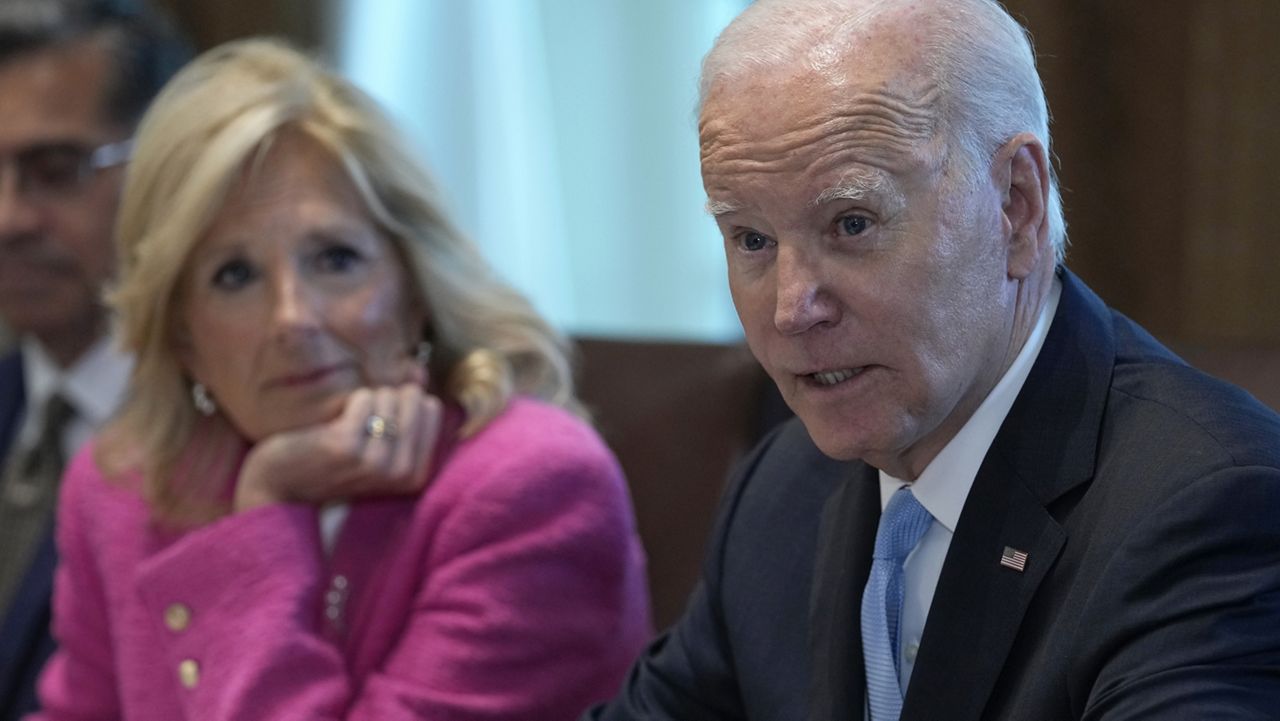Building on recent momentum in his Cancer Moonshot initiative, President Joe Biden alongside first lady Jill Biden convened his Cancer Cabinet on Wednesday, announcing a slew of new actions to advance the ambitious goal of cutting cancer death rates in half in the next quarter-century.
“The bottom line is the Cancer Moonshot today embodies America as a nation of possibilities,” Biden said seated next to the first lady.
Among Wednesday’s announcements is a new $240 million investment, focused on “making sure that we're driving innovation, delivering progress,” Deputy Assistant to the President for the Cancer Moonshot Danielle Carnival said in an interview with Spectrum News on Wednesday.
The funds will be awarded to researchers and innovators seeking to find new ways to prevent, detect, treat and survive cancer. That includes projects developing new tools to detect cancer early and those pursuing new treatments such as targeting cancer inside the body with bacteria, and designing devices that can deliver treatments directly to cancer cells in an effort to treat tumors more effectively.
“ARPA-H has calls for applications out there for specific topics and a broad one so people across the country can send their best ideas and contribute to this big mission of ending cancer as we know it,” Carnival said.
The president established ARPA-H or the Advanced Research Projects Agency for Health last year – drawing comparisons to the Department of Defense’s DARPA, which makes investments to spur innovation when it comes to technologies for national security.
“This is through the brand new agency that the president set up, and then bipartisan members of Congress funded that will reach all across the country,” Carnival said. “We'll look at things like delivering new ways to screen for cancer, making sure we have the latest innovations to treat cancer, and that we have networks – data networks, clinical trial networks – that reach across this country to reach all patients.”
Battling cancer is part of President Biden’s “Unity Agenda,” a list of broad-consensus priorities he unveiled at last year’s State of the Union address, and an issue close to his heart. His son, Beau, died in 2015 after battling an aggressive form of brain cancer.
“It’s personal for the president, the first lady, it's personal for me and we know it touches nearly every American family,” Carnival said.
“Cancer has touched nearly every family in America, including ours,” Biden said in July. "That’s why Jill and I believe so deeply in the Cancer Moonshot, which will be transformational for people across the country and around the world. That’s why it’s a central component of my Unity Agenda, which aims to bring people from both parties together to get big things done for the American people.”
Biden was tasked with heading up the Cancer Moonshot initiative when he was vice president in 2016. The president reignited the effort in February of last year with the specific goal of dramatically cutting deaths from the disease.
In July, the President announced the first program through ARPA-H that seeks to develop new technologies for removing cancerous tumors with better precision and accuracy.
Last month, came the announcement of the agency’s first project, which aims to develop generalizable mRNA platforms that can be used to train the immune system to more effectively fight cancer, along with other diseases.
The first lady is expected to visit the lab at Emory University in Atlanta that is leading the project on Friday.
“Using existing mRNA technology to amp up and boost the immune system and fight cancer, is something that we have at our fingertips,” Carnival said. “So I think that project will move forward quickly and we may see the results and progress from that because the technology is so close.”
Carnival spoke about the balance of seeking to drive breakthrough innovation that may take time with efforts to ensure the public sees tangible improvements in the present.
“We want to make sure that people today facing cancer have better answers, better treatments, and the best that we have across this country in an equitable way,” she said.
Wednesday's announcements also include a nationwide health network aimed at bringing cancer clinical trials to underserved communities, “biomedical data fabric toolbox” — a partnership between the National Institutes of Health, the National Cancer Institute and other groups to try and streamline data accessibility — and a new award for community health centers that meet certain benchmarks in cancer screening targets.
The administration is also taking new steps to tackle the biggest single driver of cancer deaths nationwide: smoking.
The American Cancer Society says that tobacco use is the leading preventable cause of death in the U.S., with smoking accounting for 20% of all cancers and about 30% of all cancer deaths nationwide. According to the Centers for Disease Control and Prevention, cigarette smoking is the No. 1 risk factor for lung cancer, and is linked to 80-90% of lung cancer deaths.
The administration is announcing awardees of a five-year, $15 million program to help increase adoption, implementation, and enforcement of policies prohibiting the sale of menthol and other flavored tobacco products, a new plan to expand efforts to help Americans quit smoking and a pilot program aimed at increasing veteran engagement in tobacco-use treatment programs.
The Cancer Moonshot also announced new commitments from a slew of non-governmental organizations, including the American Cancer Society, which will create and implement a standardized national curricula for professional, non-clinician navigators to support people with cancer, CVS Health, which is set to launch an expanded smoking cessation program, and TOUCH, the Black Breast Cancer Alliance, which will commit to reaching 350,000 Black women and motivating 25,000 into trial portals in an effort to boost Black women’s breast cancer clinical trial participation by 2025.



